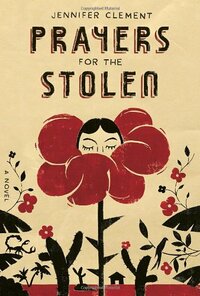Take a photo of a barcode or cover
This is not a lighthearted book by any stretch of the imagination. Prayers for the Stolen is set in the state of Guerrero in Mexico, in a mountain town ravaged by the drug trade. The men have all left, either to try to make a living in the United States or to join the drug trade, and the women do everything they can to make themselves look ugly so they won't be kidnapped. The children grow up with a different volunteer schoolteacher coming to their remote town each year, and they learn life-preserving tricks like running away from the sound of helicopters (which might be dropping dangerous herbicides from above) and concealing themselves in holes in the ground when they hear the sound of SUVs screeching into town.
The narrator sounds bored and matter-of-fact when describing both the best and the worst elements in her life. When we discussed this book in my book club, a lot of people were bothered by how emotionally flat she seemed and how we couldn't get into her head. Those characteristics felt authentic to me given her situation, but it's true that Ladydi is not a narrator who is going to let you get close to her.
"Enjoyed" is not the right word for a book like Prayers for the Stolen, but I raced through the first half of the book because I was very engaged with the story. However, only the first half of the book is set in the mountain village, and once Ladydi leaves for Acapulco, the story started losing its power for me. When the scene changes again for the final section of the book, we are suddenly introduced to many characters all at once without much reason to care about most of them, and everything really fell apart for me at that point.
Overall I'm glad I read Prayers for the Stolen; it's an eye-opening novel in a lot of ways because the issues it describes are real. However, it didn't really work as a cohesive novel to me, and what was supposed to feel horrific the whole way through started feeling absurd toward the end.
The narrator sounds bored and matter-of-fact when describing both the best and the worst elements in her life. When we discussed this book in my book club, a lot of people were bothered by how emotionally flat she seemed and how we couldn't get into her head. Those characteristics felt authentic to me given her situation, but it's true that Ladydi is not a narrator who is going to let you get close to her.
"Enjoyed" is not the right word for a book like Prayers for the Stolen, but I raced through the first half of the book because I was very engaged with the story. However, only the first half of the book is set in the mountain village, and once Ladydi leaves for Acapulco, the story started losing its power for me. When the scene changes again for the final section of the book, we are suddenly introduced to many characters all at once without much reason to care about most of them, and everything really fell apart for me at that point.
Overall I'm glad I read Prayers for the Stolen; it's an eye-opening novel in a lot of ways because the issues it describes are real. However, it didn't really work as a cohesive novel to me, and what was supposed to feel horrific the whole way through started feeling absurd toward the end.
I wanted to love this book because I think it’s just such an interesting and powerful story that needs to be told. What is it like to grow up in the crossfire of Mexico’s bloody criminal wars, particularly as a young girl? It starts off strong: “The best thing you can be in Mexico is an ugly girl.” (p. 5). However, the storytelling never really reached the actual story’s potential. It was a little hard to follow—don’t get me started on the lack of quotation marks—and I think it made several parts of the story less compelling than they could have been. I wish this book was longer and better written.
This is a compelling story with a crafty plot and an appreciable message but not a strong novel. I’ll engage Roxane Gay’s review for support. She says she found herself hoping for more “robustness” from the plot, and she comments that the book feels more like “connected vignettes” than a novel. I endorse these sentiments fully. I also agree that “the chronology of the novel is hard to follow” (in the beginning). That being said, there is a discussion guide at the end of this novel that is gold and aims to unpack the messages that the author doesn’t make more vivid. The guide redeems the novel to the point where I could consider giving it 4 stars (but I won’t).
When selecting this novel I was looking to read a Latinx author. While Clement is Hispanic/ Spanish-speaking, she’s not latinx. (This information was a little hard to uncover.) She’s a white American from Connecticut who grew up in Mexico and identifies as “American-Mexican” (eye roll). Once I better understood her identity, I was immediately less interested in her commentary on race and culture. However, Clement proved more perceptive than I had imagined. She does a good job recognizing prejudice and inequality within a culture (rural v. city) whereas many outsiders have a tendency to homogenize cultures. Clement achieves this without introducing inappropriate biases or even much opinion. This insight is well done. Of course, I also appreciate her feminist messages, including the “danger of female beauty.” The only fault I can find with respect to her “white feminist” lens is that there’s more room for cultural appreciation and general positivity. Without these elements, Western writers are always in danger of either attacking a culture or painting helpless victims, when no one wants to be viewed as helpless. Of course, an actual Mexican is better suited to communicate such appreciation/ positivity (which is why I wanted to read a latinx author in the first place).
I’d recommend this book to younger readers in a group setting.
When selecting this novel I was looking to read a Latinx author. While Clement is Hispanic/ Spanish-speaking, she’s not latinx. (This information was a little hard to uncover.) She’s a white American from Connecticut who grew up in Mexico and identifies as “American-Mexican” (eye roll). Once I better understood her identity, I was immediately less interested in her commentary on race and culture. However, Clement proved more perceptive than I had imagined. She does a good job recognizing prejudice and inequality within a culture (rural v. city) whereas many outsiders have a tendency to homogenize cultures. Clement achieves this without introducing inappropriate biases or even much opinion. This insight is well done. Of course, I also appreciate her feminist messages, including the “danger of female beauty.” The only fault I can find with respect to her “white feminist” lens is that there’s more room for cultural appreciation and general positivity. Without these elements, Western writers are always in danger of either attacking a culture or painting helpless victims, when no one wants to be viewed as helpless. Of course, an actual Mexican is better suited to communicate such appreciation/ positivity (which is why I wanted to read a latinx author in the first place).
I’d recommend this book to younger readers in a group setting.
Tärkeä puheenvuoro naisten alistetusta asemasta Meksikossa.
Maybe this deserves five stars for the impact it leaves. Maybe this deserves five stars because it brings awareness to a privileged culture of a very harsh, destructive, oppressive culture that very much exists today. Maybe it deserves five stars because there's nothing like this, and it's social activism, and it makes you think about bleak realities.
Maybe.
But I didn't enjoy reading it. The language read like poetry (makes sense - the author's a poet), and I'm glad there's a book out there that reflects on the lives of women involved in the periphery of the Mexican drug cartels. But I did not enjoy reading it. Trigger warnings abound, even though they're hazy. It made me rage and it made me weep. This is not easy to digest. And I would not read it again willingly.
A very tough (albeit short) book to get through. VERY tough.
Maybe.
But I didn't enjoy reading it. The language read like poetry (makes sense - the author's a poet), and I'm glad there's a book out there that reflects on the lives of women involved in the periphery of the Mexican drug cartels. But I did not enjoy reading it. Trigger warnings abound, even though they're hazy. It made me rage and it made me weep. This is not easy to digest. And I would not read it again willingly.
A very tough (albeit short) book to get through. VERY tough.
Absolutely beautiful. Completely raw, dirty and brutal. So incredibly well written in beautiful rolling prose.
One thing about the Amazon Vine program is that there are 100s of books available to choose to review, so I often only click on books with great covers. I thought this cover was especially interesting and decided to read the first couple of pages to see what it was all about:
Holy cow. After that start, I had to read this book. While this is a work of fiction, Jennifer Clement lives in Mexico City and has done a great job of capturing the current reality of much of today's rural Mexico. The author has a gift for turning fields of poppies, mountains of beer bottles, spiders, scorpions, dirt, and isolation into a kind of poetry. The women of this book refuse to give up on the men who have left them behind in a poor village less than an hour from Acapulco. "Being in a place without men is like being asleep without dreams." There is a type of sad beauty in the story of these women who hope, hide, and survive. Ladydi finds solace in her secret half-sister. Her mother drowns her sorrows in beer and the History Channel. The beautiful Paula is poisoned by misplaced poppy crop poison and stolen by drug lords. Life is not easy, but in the end, these women have each other.
This book was published by the publishing company Virginia & Leonard Woolf started in their home, Hogarth Press. Having just read a book by Woolf, I find it fitting that this book be endorsed by her publishing company. It is a thing of beauty juxtaposed with the bitterness of the reality of modern Mexico. Thousands of reviewers on both amazon and GoodReads have collectively given this book around a 4.5-star rating. If you have an interest in the state of life in present-day Mexico, I strongly recommend adding this book to your must-read list.
Now we make you ugly, my mother said. ... I watched her move the piece of charcoal across my face. It's a nasty life, she whispered.
It's my first memory. ...I must have been about five years old. ...The best thing you can be in Mexico is an ugly girl. ...
As a child my mother used to dress me up as a boy and call me Boy.
I told everyone a boy was born, she said.
If I were a girl then I would be stolen. All the drug traffickers had to do was hear that there was a pretty girl around and they'd sweep onto our lands in black Escalades and carry the girl off.
On television I watched girls getting pretty, combing their hair and braiding it with pink bows or wearing makeup, but this never happened in my house.
Maybe I need to knock your teeth out, my mother said.
Holy cow. After that start, I had to read this book. While this is a work of fiction, Jennifer Clement lives in Mexico City and has done a great job of capturing the current reality of much of today's rural Mexico. The author has a gift for turning fields of poppies, mountains of beer bottles, spiders, scorpions, dirt, and isolation into a kind of poetry. The women of this book refuse to give up on the men who have left them behind in a poor village less than an hour from Acapulco. "Being in a place without men is like being asleep without dreams." There is a type of sad beauty in the story of these women who hope, hide, and survive. Ladydi finds solace in her secret half-sister. Her mother drowns her sorrows in beer and the History Channel. The beautiful Paula is poisoned by misplaced poppy crop poison and stolen by drug lords. Life is not easy, but in the end, these women have each other.
This book was published by the publishing company Virginia & Leonard Woolf started in their home, Hogarth Press. Having just read a book by Woolf, I find it fitting that this book be endorsed by her publishing company. It is a thing of beauty juxtaposed with the bitterness of the reality of modern Mexico. Thousands of reviewers on both amazon and GoodReads have collectively given this book around a 4.5-star rating. If you have an interest in the state of life in present-day Mexico, I strongly recommend adding this book to your must-read list.
In the mountains of Guerrero, there is more to be afraid of than the deadly snakes, spiders and scorpions that lurk in the rubber plant jungle. The rumble of an engine chills the blood, sending teenage girls scurrying into holes dug in the ground, desperate to avoid being stolen by prowling Narco's. Those who are taken never return but every one is aware of their fate - to be used, abused, traded, sold and eventually murdered by the cartels.
Ladydi Garcia Martinez, named for the British princess, lives with her mother, a kleptomaniac alcoholic, in an impoverished rural Mexican village 'an hour by bus and four hours by mule from Acapulco'. Her father is long gone, like all of the men in the village, having made a new life for himself in America. From birth Ladydi, and her friends, are dressed as boys, until puberty hits and their mothers blacken their daughters teeth and rub charcoal into their skin in a desperate effort to protect them from the notice of the cartels.
"The best thing you can be in Mexico is a ugly girl"
Despite the poverty, the hardship, and daily dangers, there is no trace of self-pity in Ladydi's voice, her life is simply what it is, and not much different from that of her friends, Paula, Maria and Estifani, though each girl faces their own additional challenges. It is not always easy to read, for though rarely explicit, Clements portrays the society in which Ladydi lives, and her experiences, with searing honesty.
Clements writing is simple, even stark, yet it possess an unusual beauty that illustrates the harsh landscape and society in which the novel is set. The narrative is well paced, some may be irritated by the lack of speech marks - I barely noticed.
Prayers for the Stolen may be fiction but this way of life is reality for too many of the women and girls in Mexico. Thought provoking, moving and powerful this is a story of compelling character and courage.
"Nekad nelūdzies mīlestību un veselību, un arī naudu ne. Ja Dievs izdzirdēs, ko tu gribi īstenībā, Viņš tev to nedos, (...) meties ceļos un lūdzies karotes..."
Brīnišķīgi skaistos vārdos savīts traģisks stāsts. Meistarīgi!
Brīnišķīgi skaistos vārdos savīts traģisks stāsts. Meistarīgi!
Fantastic, detailed perspective of life in rural Mexico — empty villages ravaged by druglords, human trafficking, and immigration to the U.S. The characters are young and naive despite their harsh environments, and somehow endure the awful events that happen to them and fight for survival. Surprisingly, I found that this is not a book that brings you down or is difficult to read because of the traumatic events. The book grips you and submerges you in its world, with seemingly no effort.








